(完整word版)英语主从复合句大全
- 格式:doc
- 大小:121.51 KB
- 文档页数:10
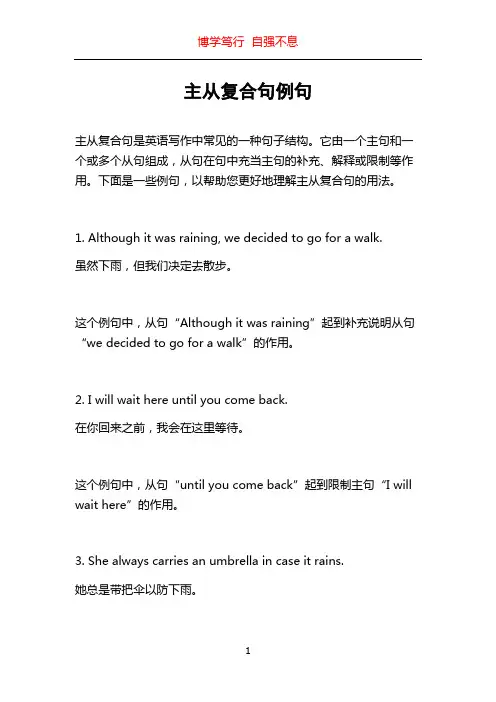
主从复合句例句主从复合句是英语写作中常见的一种句子结构。
它由一个主句和一个或多个从句组成,从句在句中充当主句的补充、解释或限制等作用。
下面是一些例句,以帮助您更好地理解主从复合句的用法。
1. Although it was raining, we decided to go for a walk.虽然下雨,但我们决定去散步。
这个例句中,从句“Although it was raining”起到补充说明从句“we decided to go for a walk”的作用。
2. I will wait here until you come back.在你回来之前,我会在这里等待。
这个例句中,从句“until you come back”起到限制主句“I will wait here”的作用。
3. She always carries an umbrella in case it rains.她总是带把伞以防下雨。
这个例句中,从句“in case it rains”起到解释主句“She always carries an umbrella”的作用。
4. My brother, who is a doctor, works at the local hospital.我的弟弟是一名医生,他在当地医院工作。
这个例句中,从句“who is a doctor”起到说明主句“My brother works at the local hospital”的作用。
5. After I finish my work, I will go to the gym.我完成工作后,我会去健身房。
这个例句中,从句“After I finish my work”起到补充说明主句“I wil l go to the gym”的作用。
6. The book that I am reading is very interesting.我正在读的那本书很有趣。
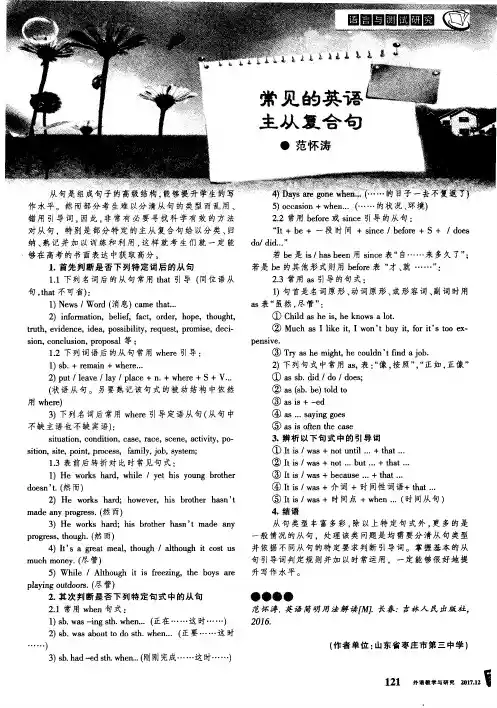
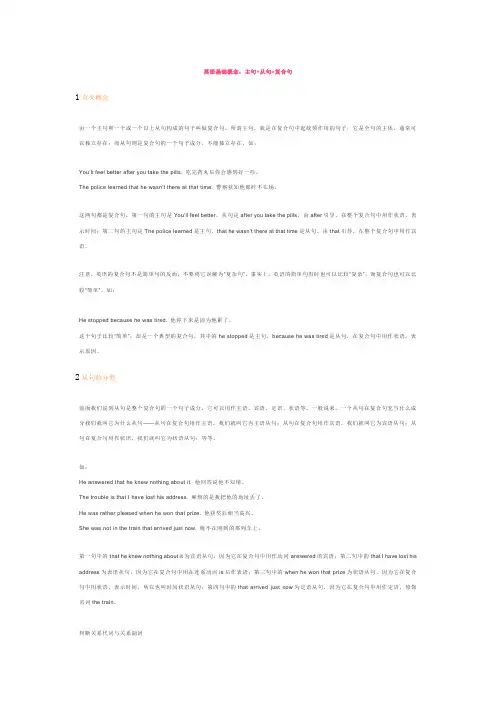
英语基础概念:主句+从句=复合句1有关概念由一个主句和一个或一个以上从句构成的句子叫做复合句。
所谓主句,就是在复合句中起统领作用的句子,它是全句的主体,通常可以独立存在;而从句则是复合句的一个句子成分,不能独立存在。
如:You’ll feel better after you take the pills. 吃完药丸后你会感到好一些。
The police learned that he wasn’t there at that time. 警察获知他那时不在场。
这两句都是复合句,第一句的主句是You’ll feel better,从句是after you take the pills,由after引导,在整个复合句中用作状语,表示时间;第二句的主句是The police learned是主句,that he wasn’t there at that time是从句,由that引导,在整个复合句中用作宾语。
注意,英语的复合句不是简单句的反面,不要将它误解为“复杂句”。
事实上,英语的简单句有时也可以比较“复杂”,而复合句也可以比较“简单”。
如:He stopped because he was tired. 他停下来是因为他累了。
这个句子比较“简单”,却是一个典型的复合句,其中的he stopped是主句,because he was tired是从句,在复合句中用作状语,表示原因。
2从句的分类前面我们说到从句是整个复合句的一个句子成分,它可以用作主语、宾语、定语、状语等。
一般说来,一个从句在复合句充当什么成分我们就叫它为什么从句——从句在复合句用作主语,我们就叫它为主语从句;从句在复合句用作宾语,我们就叫它为宾语从句;从句在复合句用作状语,我们就叫它为状语从句;等等。
如:He answered that he knew nothing about it. 他回答说他不知情。
The trouble is that I have lost his address. 麻烦的是我把他的地址丢了。
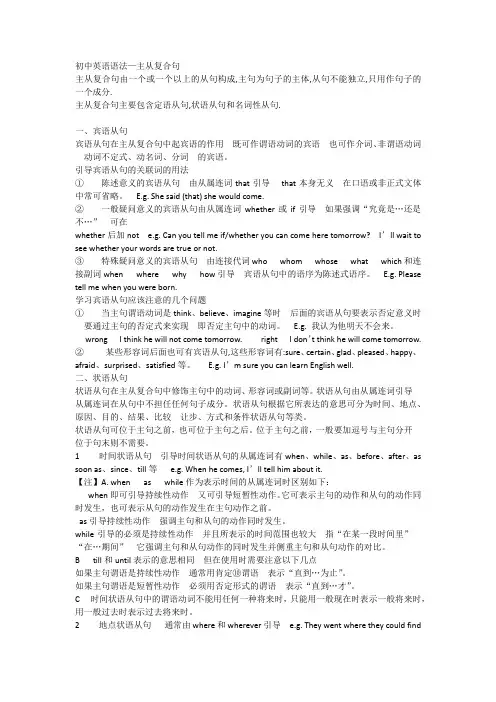
初中英语语法—主从复合句主从复合句由一个或一个以上的从句构成,主句为句子的主体,从句不能独立,只用作句子的一个成分.主从复合句主要包含定语从句,状语从句和名词性从句.一、宾语从句宾语从句在主从复合句中起宾语的作用 既可作谓语动词的宾语 也可作介词、非谓语动词 动词不定式、动名词、分词 的宾语。
引导宾语从句的关联词的用法①陈述意义的宾语从句 由从属连词that引导 that本身无义 在口语或非正式文体中常可省略。
E.g. She said (that) she would come.②一般疑问意义的宾语从句由从属连词whether或if引导 如果强调“究竟是…还是不…” 可在whether后加not e.g. Can you tell me if/whether you can come here tomorrow? I’ll wait to see whether your words are true or not.③特殊疑问意义的宾语从句 由连接代词who whom whose what which和连接副词when where why how引导 宾语从句中的语序为陈述式语序。
E.g. Please tell me when you were born.学习宾语从句应该注意的几个问题①当主句谓语动词是think、believe、imagine等时 后面的宾语从句要表示否定意义时 要通过主句的否定式来实现 即否定主句中的动词。
E.g. 我认为他明天不会来。
wrong I think he will not come tomorrow. right I don’t think he will come tomorrow.②某些形容词后面也可有宾语从句,这些形容词有:sure、certain、glad、pleased、happy、afraid、surprised、satisfied等。
E.g. I’m sure you can learn English well.二、状语从句状语从句在主从复合句中修饰主句中的动词、形容词或副词等。
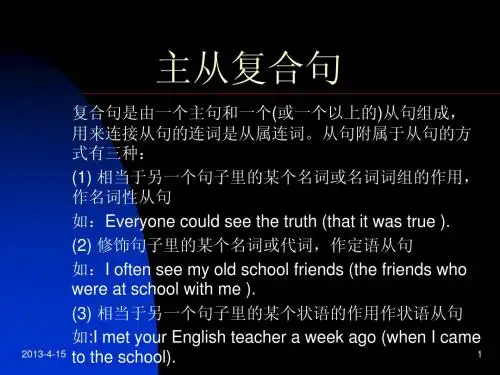
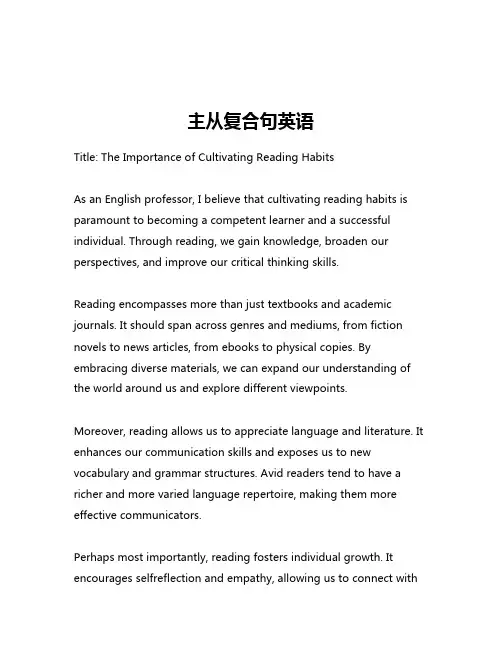
主从复合句英语Title: The Importance of Cultivating Reading HabitsAs an English professor, I believe that cultivating reading habits is paramount to becoming a competent learner and a successful individual. Through reading, we gain knowledge, broaden our perspectives, and improve our critical thinking skills.Reading encompasses more than just textbooks and academic journals. It should span across genres and mediums, from fiction novels to news articles, from ebooks to physical copies. By embracing diverse materials, we can expand our understanding of the world around us and explore different viewpoints.Moreover, reading allows us to appreciate language and literature. It enhances our communication skills and exposes us to new vocabulary and grammar structures. Avid readers tend to have a richer and more varied language repertoire, making them more effective communicators.Perhaps most importantly, reading fosters individual growth. It encourages selfreflection and empathy, allowing us to connect withcharacters, themes, and ideas we encounter in literature. Through reading, we can gain a deeper understanding of ourselves and others, ultimately leading to personal growth and development.Therefore, I urge everyone, regardless of their backgrounds and professions, to cultivate a reading habit as part of their daily routine. Reading is an investment in oneself that pays great dividends in all aspects of life.。
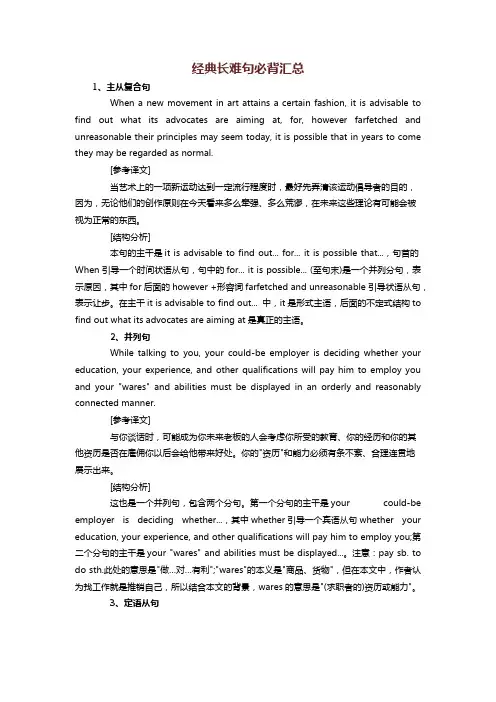
经典长难句必背汇总1、主从复合句 When a new movement in art attains a certain fashion, it is advisable to find out what its advocates are aiming at, for, however farfetched and unreasonable their principles may seem today, it is possible that in years to come they may be regarded as normal. [参考译文] 当艺术上的一项新运动达到一定流行程度时,最好先弄清该运动倡导者的目的,因为,无论他们的创作原则在今天看来多么牵强、多么荒谬,在未来这些理论有可能会被视为正常的东西。
[结构分析] 本句的主干是it is advisable to find out... for... it is possible that...,句首的When引导一个时间状语从句,句中的for... it is possible... (至句末)是一个并列分句,表示原因,其中for后面的however +形容词farfetched and unreasonable引导状语从句,表示让步。
在主干it is advisable to find out... 中,it是形式主语,后面的不定式结构to find out what its advocates are aiming at是真正的主语。
2、并列句 While talking to you, your could-be employer is deciding whether your education, your experience, and other qualifications will pay him to employ you and your "wares" and abilities must be displayed in an orderly and reasonably connected manner. [参考译文] 与你谈话时,可能成为你未来老板的人会考虑你所受的教育、你的经历和你的其他资历是否在雇佣你以后会给他带来好处。
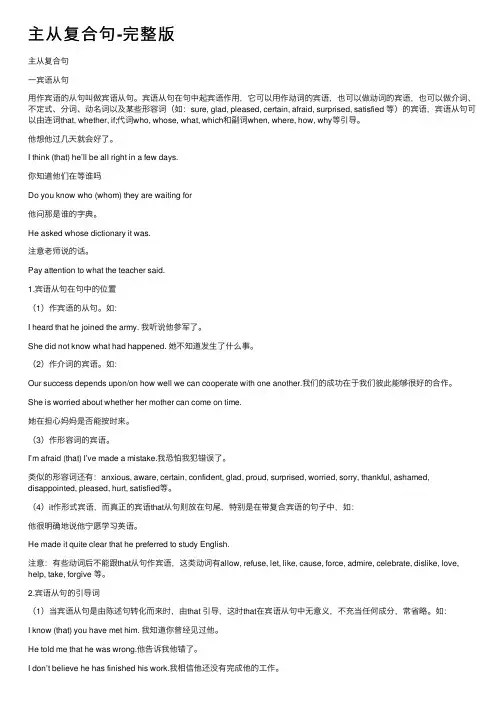
主从复合句-完整版主从复合句⼀宾语从句⽤作宾语的从句叫做宾语从句。
宾语从句在句中起宾语作⽤,它可以⽤作动词的宾语,也可以做动词的宾语,也可以做介词、不定式、分词、动名词以及某些形容词(如:sure, glad, pleased, certain, afraid, surprised, satisfied 等)的宾语,宾语从句可以由连词that, whether, if;代词who, whose, what, which和副词when, where, how, why等引导。
他想他过⼏天就会好了。
I think (that) he’ll be all right in a few days.你知道他们在等谁吗Do you know who (whom) they are waiting for他问那是谁的字典。
He asked whose dictionary it was.注意⽼师说的话。
Pay attention to what the teacher said.1.宾语从句在句中的位置(1)作宾语的从句。
如:I heard that he joined the army. 我听说他参军了。
She did not know what had happened. 她不知道发⽣了什么事。
(2)作介词的宾语。
如:Our success depends upon/on how well we can cooperate with one another.我们的成功在于我们彼此能够很好的合作。
She is worried about whether her mother can come on time.她在担⼼妈妈是否能按时来。
(3)作形容词的宾语。
I’m afraid (that) I’ve made a mistake.我恐怕我犯错误了。
类似的形容词还有:anxious, aware, certain, confident, glad, proud, surprised, worried, sorry, thankful, ashamed, disappointed, pleased, hurt, satisfied等。
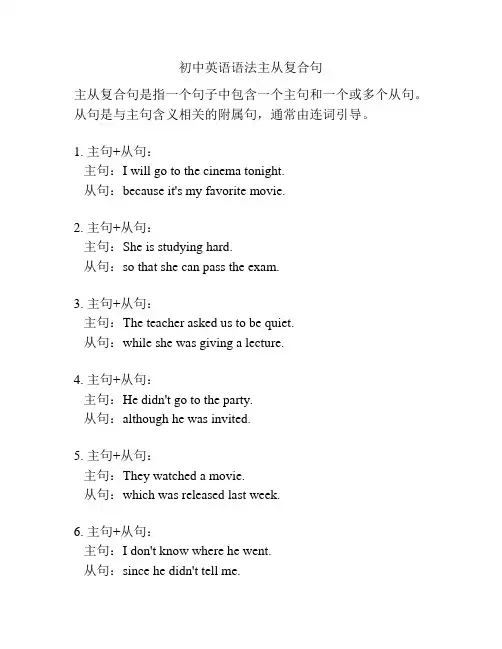
初中英语语法主从复合句主从复合句是指一个句子中包含一个主句和一个或多个从句。
从句是与主句含义相关的附属句,通常由连词引导。
1. 主句+从句:主句:I will go to the cinema tonight.从句:because it's my favorite movie.2. 主句+从句:主句:She is studying hard.从句:so that she can pass the exam.3. 主句+从句:主句:The teacher asked us to be quiet.从句:while she was giving a lecture.4. 主句+从句:主句:He didn't go to the party.从句:although he was invited.5. 主句+从句:主句:They watched a movie.从句:which was released last week.6. 主句+从句:主句:I don't know where he went.从句:since he didn't tell me.7. 主句+从句:主句:She wants to buy a new car.从句:because her old one broke down.在这些例子中,主从复合句的关系是主句是主要内容,而从句是对主句的补充、说明、原因或条件。
起到进一步解释主句的作用。
从句的引导词包括连词如because、so that、while、although,以及关系代词/副词如which、where、because等。
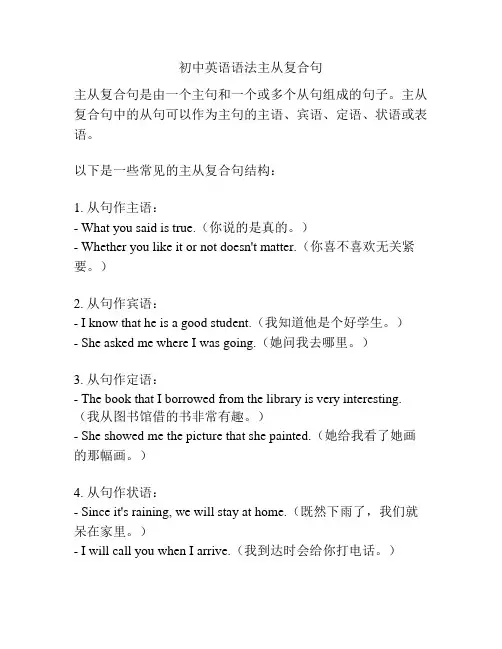
初中英语语法主从复合句主从复合句是由一个主句和一个或多个从句组成的句子。
主从复合句中的从句可以作为主句的主语、宾语、定语、状语或表语。
以下是一些常见的主从复合句结构:1. 从句作主语:- What you said is true.(你说的是真的。
)- Whether you like it or not doesn't matter.(你喜不喜欢无关紧要。
)2. 从句作宾语:- I know that he is a good student.(我知道他是个好学生。
)- She asked me where I was going.(她问我去哪里。
)3. 从句作定语:- The book that I borrowed from the library is very interesting.(我从图书馆借的书非常有趣。
)- She showed me the picture that she painted.(她给我看了她画的那幅画。
)4. 从句作状语:- Since it's raining, we will stay at home.(既然下雨了,我们就呆在家里。
)- I will call you when I arrive.(我到达时会给你打电话。
)5. 从句作表语:- His dream is that he wants to become a doctor.(他的梦想是想成为一名医生。
)- The fact is that he didn't pass the exam.(事实是他考试没通过。
)需要注意的是,从句和主句之间的关系要用适当的连词连接起来,如that, whether, while, when, because, if等。
此外,从句的动词形式和时态也要根据上下文的需要进行调整。
希望这些例句可以帮助你理解主从复合句的用法。
如果有任何问题,请随时向我提问。
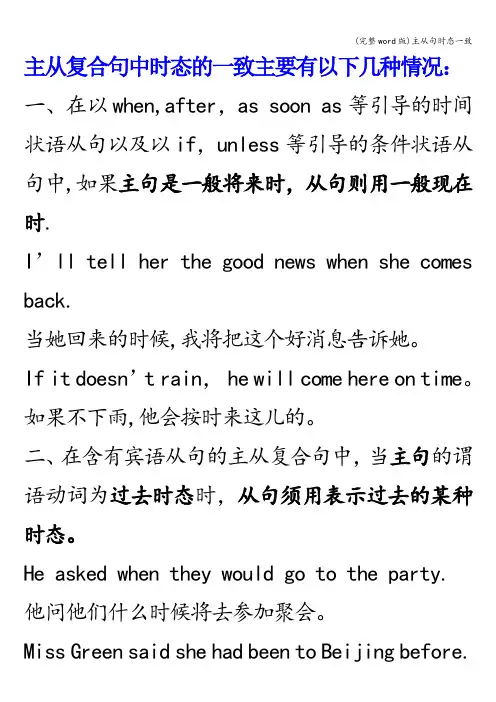
主从复合句中时态的一致主要有以下几种情况:一、在以when,after,as soon as等引导的时间状语从句以及以if,unless等引导的条件状语从句中,如果主句是一般将来时,从句则用一般现在时.I’ll tell her the good news when she comes back.当她回来的时候,我将把这个好消息告诉她。
If it doesn’t rain, he will come here on time。
如果不下雨,他会按时来这儿的。
二、在含有宾语从句的主从复合句中,当主句的谓语动词为过去时态时,从句须用表示过去的某种时态。
He asked when they would go to the party.他问他们什么时候将去参加聚会。
Miss Green said she had been to Beijing before.格林小姐说她以前曾经去过北京.三、在宾语从句中,当主句的时态为一般现在时、现在进行时、现在完成时等时态时,后面从句时态不受主句限制,可根据情况,选用各种适合的时态。
Do you know when we’ll have a football match?你知道我们什么时候举行足球赛吗?You know he has gone to Shanghai。
你知道他已去上海了。
四、当宾语从句表述的是客观事实、科学真理、现在的习惯动作以及格言等时,其时态不受主句限制,而用一般现在时。
The teacher told us that light travels faster than sound。
老师告诉我们光速比音速要快.When I was a student, my teacher often toldus that time and tide wait for no man.当我还是学生的时候,老师常常告诉我们,岁月不等人。
五、在"since+点时间”句型中,主句通常用现在完成时,从句用一般过去时。
状语从句一,时间状语从句1, Whenever Tom ______ a Chinese exam, he gets nervous.A had takenB tookC takesD will take3, Once he ______ a promise, he will never break it.A makesB madeC had madeD will make6, I’m sure he’ll come to see me before he ______ to London.A will flyB is flyingC flyD flies7, When he got to the station, the train ______ .A leftB had leftC leavesD has left9, You should make a good plan ______ you do anything important.A beforeB afterC thoughD until10, Walk down this street ______ you reach the third traffic lights.A whenB untilC afterD since12, I won’t believe that little Bob can run 100 metres in 15 seconds ______ I see it with my own eyes.A untilB afterC whenD if13, How ______ since I saw you last time?A are youB will you beC were youD have you been14, It ______ 10 yeats since they got married.A isB wasC would beD had been15, My aunt asked me to take care of her baby ______ she was shopping.A as soon asB untilC whileD once16, ______ there is life, there is hope.A WhileB SinceC By the timeD Before17, Unfortunately, ______ cars are giving us so much pleasure, they are also doing harm to us.A whenB asC sinceD while18, I was walking in the street ______ someone stopped me.A whileB asC whenD after19, Father was reading newspapers while Mum ______ dinner.A was cookingB cookedC has cookedD will cook二,条件状语从句1, We’ll go to visit Tian’anmen Square ______ it doesn’t rain tomorrow.A ifB as soon asC when d since2, The doctor said the patient would die ______ he was sent to hospital at one.A ifB unlessC providedD as long as3, ______ anything important happen, please call me.A SinceB By the timeC So thatD In case4, ______ you don’t lose heart, you’ll find a way out.A SupposedB ProvideC As long asD Unless5, If it ______ tomorrow, we’ll go hiking in the mountain.A didn’t rainB doesn’t rainC would rain d hadn’t rained6, Unless you come earlier tomorrow, you ______ him.A wouldn’t seeB won’t see c hadn’t seen D haven’t seen7, ______ work is a pleasure, life is joy.A WhenB ProvideC SupposesD Provides8, Study hard ______ you’ll get good grades.A andB ifC unlessD as long as10, Supposing that you won 5 million dollars, what ______ you ______ ?A will; doB are; doingC would; doD had; done三,地点状语从句1, ______ I went, my dog followed me.A WhereverB AfterC SinceD Before2, He went ______ he could find strange insects.A unlessB ifC whenD anywhere3, ______ there is smoke, there is fire.A UnlessB WhereC SinceD By the time四,原因状语从句1, Betty didn’t go to the movie with us yesterday ______ she was ill.A butB soC untilD because2, ______ there’s nothing else to do, we want to leave early.A SinceB ForC becauseD so4, ______ it was raining heavily, he took a taxi home.A SoB Because ofC ForD Because5, If you feel cold, it is ______ you didn’t put on your sweater.A becauseB forC sinceD because of五,方式状语从句1, You must do everything ______ I do.A asB as ifC as thoughD if六,结果状语从句1, We hurried ______ we didn’t miss the last bus.A becauseB ifC so thatD when2, He worked so hard ______ he passed the exam.A thatB so thatC such thatD such3, He ran very fast, ______ he got the first prize.A thatB so thatC soD such4, This is ______ that I gave up reading it half way through.A so boring bookB such boring a bookC so boring a bookD such boring book 5, I had ______ little money then that I couldn’t even afford a used car.A so b such C too D much6, The teacher spoke ______ loudly that everyone in the big hall could hear her.A suchB soC muchD much too7, My cousin is ______ a little girl that she dare not stay at home alone.A suchB soC asD too8, The left home early ______ they couldn’t miss the train.A such thatB forC asD so that七,目的状语从句1, ______ we might see the sunrise, we started climbing the mountain at midnight.A So thatB In order thatC In caseD For fear that2, She explained again and again ______ we should misunderstand her.A in caseB so thatC such thatD in order than八,让步状语从句1, ______ it was hard work, I enjoyed it.A SoB Even thoughC As soon asD By the time2, The boy continued playing computer games ______ his patents told him not to.A so thatB such thatC althoughD since3, I’ll try to repair the tape recorder myself ______ it takes me days.A butB no matter whereC even thoughD whatever6, It was difficult work, I enjoyed it, ______ .A althoughB thoughC as thoughD even though9, Keep calm, ______ happens.A wheneverB whateverC howeverD wherever10, My patents always waited for me, no matter ______ time I got home.A whatB howC whoD where九,比较状语从句1, I am ______ you, but you are ______ than he.A as tall as; tallestB as tall as; tallerC so tall as; the tallerD so tall as; the tallest 2, The harder you study, ______ knowledge you will get.A moreB the moreC the mostD the much4, Wisdom is to the mind ______ health is to the body.A whereB whatC whenD which十,状语从句的省略1, ______ I looked at such things quite differently.A When a boy wasB when was a boyC When a boyD A boy when was2, ______ and already grey-haired, she was the picture of health.A Although over sixtyB Although was she over sixtyC Was she although over sixtyD She although over sixty was3, don’t read ______ .A while are you eatingB while eating you areC while eatingD you are while eating 4, Don’t speak ______ .A until spoken to youB until to you spokenC until spoken toD you spoken to until宾语从句一,宾语从句的引导词1, He said ______ he had finished his homework.A ifB whetherC thatD what2, I hope ______ you will enjoy your stay here.A ifB thatC whenD how3, I want to know ______ you can teach me how to send e-mail?A thatB ifC whoD how4, I wonder ______ there is any need to spend so much money on the party.A whetherB thatC whenD how5, I don’t know ______ or not I have passed the exam.A ifB whetherC thatD weather6, Everything depends on ______ .A whether the situation will improveB when will the situation improveC that the situation will improveD how will the situation improve二,宾语从句的时态1, He asked ______ .A why you came lateB why did you come lateC why you come lateD why do you come late2, The teacher said that light ______ much faster than sound.A travelledB travelC travelsD had travelled三,宾语从句的语序1, —Could you tell me ______ ?—By underground.A how did you come hereB how you came hereC when did you come hereD when you came here2, The plane hasn’t arrive yet. Could you tell me ______ ?A why the plane is lateB how is the plane lateC when will the plane arriveD that the plane arrives3,—Can you make sure ______ ?—Sorry, I can’t. But I didn’t see her just now.A where did she goB where she had goneC where she has goneD where will she go4,—Could you please tell me ______ ?—I live in Yannan.A where do you liveB where were you bornC where you liveD where you were born5,—We can use MSN to talk with each other on the Internet.—Really? Will you please show me ______ ?A how can I useB how I can useC how can I use itD how I can use it四,宾语从句的其他特殊情况1,I don’t believe he can go to the Internet bar, ______ ?A do IB don’t IC can heD can’t he2,—What did he say?—______ the next week.A That he would go to JapanB He would go to JapanC That he will go to JapanD He will go to Japan3, I realized at once ______ my homework at home.A I have leftB I had leftC that I have leftD that I had left4, I must never tell anyone ______.A what I could not see the clothB that I could not see the clothC I could not see the clothD I can not see the cloth定语从句一,关系代词的用法1, Here comes the girl ______ wants to see you.A whoseB whoC whomD which2, She is a girl ______ people like at first sight.A whichB whomC whoseD when3, I wanted to find someone with ______ I could discuss music.A whoB whichC thatD whom4, I’d like a room ______ window looks out onto the sea.A whoseB whichC whoD that5, Anyone ______ plays with fire will get burnt.A whoB whomC thatD which6, There’s an old woman ______ wants to see you.A whoseB whichC thatD who7, I met a young man outside the KFC last week ______ could play the guitar very well.A thatB whichC whoD whose8, He lives in the house ______ is opposite ours.A whichB whoC whoseD whom9, The building in ______ we live is not far from here.A thatB whichC whoD whose10, the watch ______ you gave me keeps good time.A whoB whatC whichD whose11, Carmen likes groups ______ play quiet and gentle songs.A whichB whoseC thatD whom12, I like music ______ I can dance to.A whoB thatC whereD when13, Here is the car ______ I told you about.A whoB whomC whereD that14, All ______ can be done has been done.A whichB thatC whoD whose15, It is the third dictionary ______ I’ve bought.A whomB whoC whichD that16, this is the only book ______ I need at present.A thatB whichC in whichD by which17, they talked of things and persons ______ they remembered in the school.A whoseB whomC whoD that18, She is wearing the same dress ______ she wore yesterday.A whichB whenC whereD that19, this is no longer the place ______ it used to be.A whereB whichC thatD in which20, Which is the book ______ he bought yesterday?A that b which C for which D whom21, Who ______ you have ever seen can beat him in the game?A thatB whichC whoseD when22, the girl ______ I spoke is my cousin.A to whomB of whomC from whomD for23, We stood at the top of the hill, ______ we can see the town.A thatB whomC from whereD who24, Air, ______ which man can’t live, is really important.A withB onC withoutD by二,关系副词的用法1, She came on the day ______ I was not at home.A when b which C that D whom2, 1995 was the year ______ his son was born.A thatB whichC whenD whose3, That’s the hotel ______ we were staying last summer.A whereB whichC thatD who4, Have you been to the house ______ Lu Xun once lived?A whichB thatC whereD whom5, Do you know the reason ______ she was so angry yesterday?A whichB whyC whenD whose6, This is the school ______ we visited last week.A whereB whichC whenD whose7, I’ll never forget the days ______ I spent with my best friend in Hainan.A whenB thatC whoseD where8, this is the reason ______ he gave me.A whyB whichC whereD when三,定语从句的其他特殊形式2, The days have gone ______ we played games with friends after school.A whenB whichC thatD who3, It is happiness instead of money ______ everyone seeks.A whoseB thatC whereD when4, It was I, not he, ______ am to blame for this.A whoB whichC whenD whom5, I know the men ______ in that car.A satB sittingC are sittingD is sitting6, The company wants men ______ experience.A haveB hasC withD had7, You need someone ______ you.A look afterB looks afterC to look afterD looked after8, Now, however, the furniture ______ down to the truck feels very heavy.A carriedB being carriedC have been carriedD had been carried12, After visiting China, most of the foreign friends said they would never forget the time ______ they had spent in China.A thatB whatC whenD at which。
主从复合句表语从句在句子中作连系动词的表语的从句,它位于主句中的系动词之后。
例如:That is why he did not come to school yesterday. / It is because you are so clever.宾语从句在句子中作及物动词或介词的宾语。
①基本形式:(主句+)连词+从句主语+从句谓语+...② 关于宾语从句连词的选择:若从句来源于一个陈述句,那么,连词用that,在口语中that可以省略;若从句来源于一个一般疑问句,连词则用if 或whether;若从句来源于一个特殊疑问句,则连词就是疑问词(如what,who,where,when等)例如:They believe that the computer will finally take the place of human beings.(他们相信计算机终将代替人类。
) (从句本来就是陈述句)/ I wonder whether I should say something for him to the headmaster. (我不知道是不是该为他在校长跟前说点什么。
) (从句来源于一般问句Shall I say something for him to the headmaster?) / He asked me where he could get such medicine. (他问我在哪儿能搞到那样的药。
) (从句来源于特殊问句Where can he get such medicine? )③宾语从句的时态问题:如果主句是现在时,从句则用现在某一时态,甚至可以用过去时;如主句是过去时,从句则相应地使用过去某一时态,遇到客观真理时仍然用现在时。
如:I think I will do better in English this term. (我想本学期我的英语会学得好点。
) / The teacher asked the boy if the earth is round. (老师问那个男孩地球是不是圆的。
主从复合句主句是主体,从句只是句子的一个成分,换言之,将句子(除谓语外)的各个成分扩展开来就成了从句。
关联词分五类:疑问代词:who(whom/whose),which, what,关系代词:who(whom/whose),which, that,疑问副词:when, where, why, how关系副词:when, where, why从属连词:that (无词义),whether, if, although, afterbecause, before, when, since,as soon as, as long as只有从属连词没有句子功用,即不担任句子成分。
从句分为五类:主语从句宾语从句表语从句前三项都是名词性从句,句中作用如同名词。
一般都不用逗号,所用关联词相同:1,连词that/whether/if 2, 3, 疑问副词when /where /how /why(引导间接疑问句)定语从句状语从句一.主语从句subject clause,也可分为三种:that引导的主从/ 由连接代副词引导的主从/ what和whoever等引导的主从。
1由that引导的主从,用得最多。
(that 后面是主语)“That she became an artist may have been due to her father’s influence.”她成为画家可能是受其父亲的影响。
上面句子看着别扭陌生,换成it引导的句子就熟悉了,因为一般除强调外都后置而由it代替,有五种形式:(1)+ that 、、、It is(2)、、、It’(3)宾语) or adverbial(副词)) + that、、、’re right.It struck me that we ought to make a new plan. 我忽然想起我们应该制订一个新计划。
我从未想到或许她是在说谎(4)、、、It is said)that you was suffering from a stone in the kidney. 谣传说/据说你得了肾结石。
高考英语语法讲解——主从复合句(附练习题)主从复合句(状语从句、名词性从句和定语从句)【考点分析】状语从句1. when, while , as引导时间状语从句的区别;2. 名词词组 the minute , the moment, the first time , each time ,any time等用作连词,引导的时间状语从句;3. before ,和SinCe引导时间状语从句的用法以及常见的几个句型;4. till 和Until的用法;5. although , though , as 以及 even if , even though 弓丨导让步状语从句的用法;6. 结果状语从句中“ so, that ”与“ such, that ”的区别;7. 条件状语从句 unless, PrOViding/provided ,SuPPOSe∕supposing等引导词的用法;8. “疑问词+ ever ”和“ no matter +疑问词”引导从句的用法;9. in CaSe 引导的状语从句;10. where引导的状语从句;11.once引导的状语从句。
12.与祈使句、定语从句、名词从句、倒装句以及与强调句型的混合考查。
名词从句1. that和What引导名词性从句的区别;2. 名词从句的语序和时态;3. it作形式主语、形式宾语的几种情况;4. 宾语从句的否定转移;5. whether和if的用法区别;6. what在名词性从句中的使用;2. who、whom与 whose引导的定语从句的区别;3. 关系副词where、When与Why引导的定语从句的区别;4. 对“ as”引导定语从句的考查;5. SuCh , as 与 such, that 的区别;the Same, as 与 the Same , that 的区别;6. 对“介词+关系代词”的考查;7. the Way作先行词时,定语从句的引导词作状语用 in WhiCh ,that或者省略;8. 含有插入语的定语从句;9. 与并列句、状语从句、同位语从句以及与强调句型的混合考查。
主从复合句主句就是主体,从句只就是句子得一个成分,换言之,将句子(除谓语外)得各个成分扩展开来就成了从句。
关联词分五类:疑问代词:who(whom/whose), which,what,关系代词:who(whom/whose),which, that,疑问副词:when,where,why,how关系副词:when,where, why从属连词:that (无词义),whether,if, although,afterbecause, before,when,since,as soon as,as long as只有从属连词没有句子功用,即不担任句子成分.从句分为五类:主语从句宾语从句表语从句句中作用如同名词.一般都不用逗号,所用关联词相同:1,连词that/whether /if 2,what/which 3,疑问副词when /where /how /why(引导间接疑问句) 定语从句状语从句一。
主语从句subjectclause,也可分为三种:that引导得主从/由连接代副词引导得主从/ what与whoever等引导得主从。
1由that引导得主从,用得最多。
(that 后面就是主语)“Thatshebecameanartist may havebeen duetoher father's influence、"她成为画家可能就是受其父亲得影响。
,换成it引导得句子就熟悉了,因为一般除强调外都后置而由it代替,有五种形式:(1)It+b+that、、、It is althat they should havedifferent views、(2)It + be ++that、、、It’s a at you are still alive、(3)It(+object(宾语) oradverbial(副词))+that、、、It seemsu’re right、It struckme that we oughtto make a new plan、我忽然想起我们应该制订一个新计划。
主从复合句英语English: A complex sentence consists of an independent clause and one or more dependent clauses. The independent clause is the main clause that can stand alone as a complete sentence, while the dependent clauses rely on the main clause for meaning and cannot stand alone. In a main clause-subordinate clause construction, the main clause is the dominant element, while the subordinate clause adds additional information or clarifies the main clause. This structure allows for relationships and connections to be established between different parts of a sentence, resulting in a more complex and sophisticated expression of ideas. Master-slave compound sentences are an essential tool in academic writing, allowing writers to connect ideas and build cohesion within their writing.中文翻译: 复合句由一个主句和一个或多个从句组成。
主从复合句主句是主体,从句只是句子的一个成分,换言之,将句子(除谓语外)的各个成分扩展开来就成了从句。
关联词分五类:疑问代词:who(whom/whose),which, what,关系代词:who(whom/whose),which, that,疑问副词:when, where, why, how关系副词:when, where, why从属连词:that (无词义),whether, if, although, afterbecause, before, when, since,as soon as, as long as只有从属连词没有句子功用,即不担任句子成分。
从句分为五类:主语从句宾语从句表语从句前三项都是名词性从句,句中作用如同名词。
一般都不用逗号,所用关联词相同:1,连词that/whether/if 2, 3, 疑问副词when /where /how /why(引导间接疑问句)定语从句状语从句一.主语从句subject clause,也可分为三种:that引导的主从/ 由连接代副词引导的主从/ what和whoever等引导的主从。
1由that引导的主从,用得最多。
(that 后面是主语)“That she became an artist may have been due to her father’s influence.”她成为画家可能是受其父亲的影响。
上面句子看着别扭陌生,换成it引导的句子就熟悉了,因为一般除强调外都后置而由it代替,有五种形式:(1)+ that 、、、It is(2)、、、It’(3)宾语) or adverbial(副词)) + that、、、’re right.It struck me that we ought to make a new plan. 我忽然想起我们应该制订一个新计划。
我从未想到或许她是在说谎(4)、、、It is said)that you was suffering from a stone in the kidney. 谣传说/据说你得了肾结石。
(5)、、、’t be that they were interested in him. 不,不,他们不可能对他有兴趣。
口语中that可以省略:显然他的话使她高兴。
Who is to be sent there hasn’t been decided.It’s clear enough what he meant.两种结构都能用,但是it结构更多,有四种形式。
why he behaved like tha t. 我不太清楚他为什么会这样做。
It’s a puzzle how life began.It doesn’t matter much where I live.该发生的事总会发生。
红色为从句What is over is over. 过去的事就过去了。
Whatever my dad did was right. 俺爹做的都是对的。
Whatever she says goes. 一切她说了算。
Whoever comes will be welcomed. 谁来都欢迎Whichever you want is yours. 你要哪个,哪个就归你。
二.宾语从句object clause.1由that引导到宾从,有时that可省略I suspected that it was a trick to get our money.我怀疑这是一个骗我们钱的圈套Who can guarantee that he’ll keep his word?谁能保证他会遵守诺言?You can depend upon it, I shall be there. 先行宾语(现行宾语中间要有逗号)你放心,我会去那里的。
I take it they have left for home.我猜想他们已经回家了。
2由连接代词或副词引导宾从Write me how you got home. 写信告诉我你怎能到家的Only you can decide who the best choice is.只有你能决定谁是最佳人选。
I wonder what you call this stuff.我想知道,你管这玩艺叫什么。
3由whether/if引导的宾从I’m wondering whether you would care to spend the evening with me. 不知道你是否愿意跟我们共度今宵。
I asked her if I might call and see her. 我问她是否可以去看她。
4由关系代词what引导的宾从Show me what you’ve bought.把你买的东西给我看看。
I could not express what I felt. 我无法表达内心的感受As a friend of yours, I want to tell you what I hear.作为你的朋友,我想把听到的事告诉你。
5作介词的宾从,其他从句这样用较少:Don’t oke your nose into探听what doesn’t concern you. 别多管闲事。
??6 whatever/whichever/whomever这类词也可引导宾从:I’ll just say whatever comes into my head.想到什么就说什么。
Buy whichever is cheapest. 买最便宜的。
Give it to whomever you like. 你愿意给谁就给谁。
三.表语从句predicative clause,有二类1由that引导的表语从句The fact is (that) she never liked him.事实是她从未喜欢过他。
His only fault is that he lacks ambition.他唯一的缺点是缺乏雄心大志。
2 由连接代/副词引导的、由关系代词型的what引导的That’s not what I meant. 这不是我的意思。
The question is who’s responsible for what has happened.问题是发生了这事该谁负责。
Times aren’t what they were.时代不同了。
That’s what I am here for.这就是我来这里的目的。
(四.定语从句attributive clause 没看!!1 定从的关联词有二:关系代词(在从句中作主/宾/定)who(whom/whose), which, that和关系副词(在从句中作状语)when, where, why等。
例如:Girl who works in restaurant is called waitress.This is Johnson, whose wife work at a department store.2 Which和that的区别:关系代词which指物,做主语和宾语。
限制性定从中作宾语时可省略。
关系代词that, 指物也指人,做主语和宾语,指物时与which相同。
There are the things that(which)you need.这些就是你要的东西。
A dictionary is a book, which gives the meaning of words. 词典是解释词义的书。
Who is the person that is working at a computer over there. 在计算机上干活的那个人是谁?3 在下列情形下,只能用that:(1)先行词是all / everything / nothing / something(有时例外用which)/ anything / little等不定代词时。
Is there anything (that) I can do for you in town?有什么事我可以在城里代你办吗?That’s all (that) I know. 我知道的就是这些。
(2)先行词为序数词所修饰时。
The first thing (that) I should do is to work out a plan. 我该做的第一件事是订个计划。
(3)先行词为形容词最高级所修饰时。
This is one of the most exciting football games (that) I have ever seen. 这是我看过的足球赛中最激烈的一场。
4限制性定从和非限制性定从:意义上可缺否,形式上有无逗号。
(1)that引导的定从大多是限制性的。
注意:非限制性定从不能使用that和关系副词why, 也不能省略任何关系副词,这类从句主要出现在书面语中。
如:This is the best film that I have ever seen.Last night I saw a very good film, which was about the Anti-Japanese War. “昨晚我看了一部很棒的电影,是关于抗日战争的”只是补充说明,翻译时多译成并列句:Sunday is a holiday, when people do not go to work. 礼拜天是假日,这一天人们不上班。
(2)非限制性定从中which/whom常可以跟of或其他介词连用。
Mr. Smith, for whom I was working, was very generous about overtime payments.史密斯先生是我的老板,她付超时工资很大方。
The buses, most of which were already full, were surrounded by an angry crowd.公共汽车大多都已满载,周围是一大群愤怒的人。
My kids, both of whom study abroad, ring me up, saying Hi, every week.我的俩孩子都在国外读书,每周给我打来电话问安。
(3)在限制性定从中,当关系代词在从句中作宾语时,大多可省略,特别是在被修饰的词为all / everything等词时。
如:That’s the only thing we can do now.这是我们现在唯一能做的事。
All you have to do is to fill out this form.你只需要填这张表就行了。